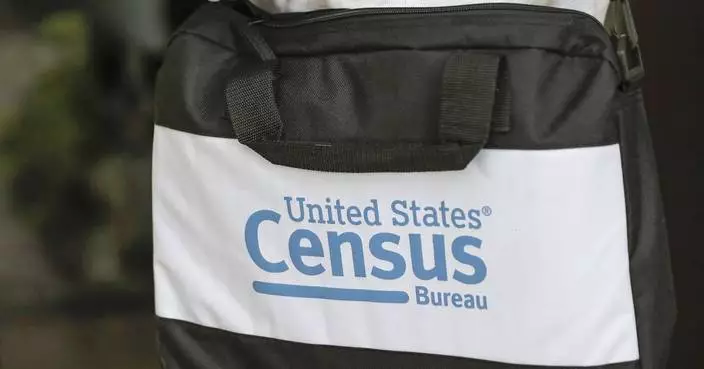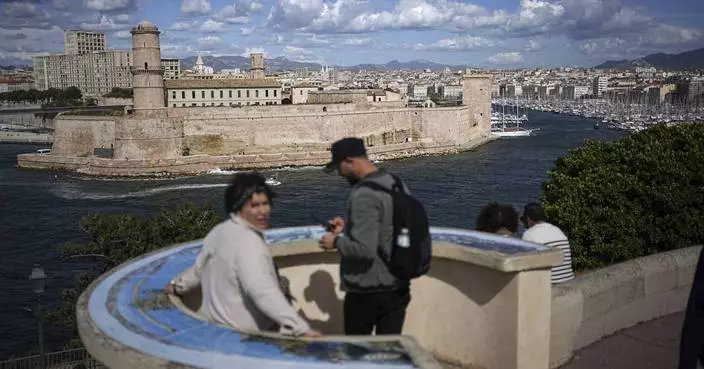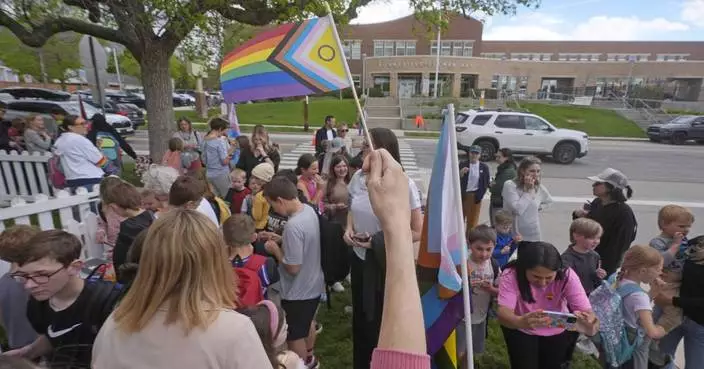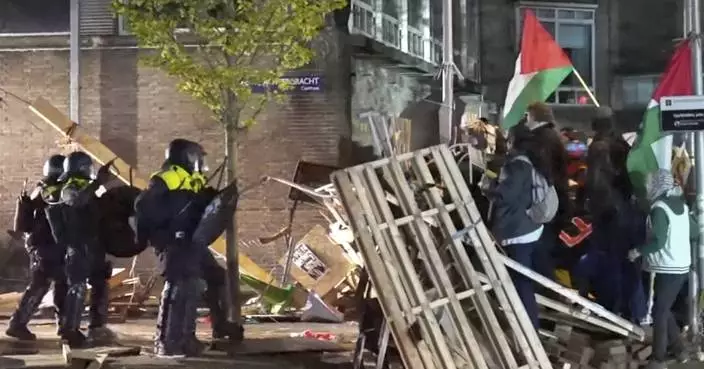France has flagged more than 78,000 people as security threats in a database intended to let European police share information on the continent's most dangerous residents — more than all other European countries put together — according to an analysis by The Associated Press.

FILE - In this file photo taken on Jan. 23 2018, a solider watches code lines on his computer screen at the French Defense ministry stand during the International Cybersecurity forum in Lille, northern France. (AP Photo/Michel Spingler, File)
A German parliamentarian, Andrej Hunko, was the first to raise the alarm about potential misuse of the Schengen Information System database in a question to his country's Interior Ministry about "discreet checks" — secret international checks on people considered a threat to national security or public safety. He questioned whether and why different countries seemed to apply very different criteria.
"The increase in alerts cannot be explained by the threat of Islamist terrorism alone. Europol reports a four-digit number of confirmed foreign fighters, yet the increase of SIS alerts in 2017 is several times that," Hunko said in a statement late last month when he released the Interior Ministry response to his query.
That response included a spreadsheet detailing for the first time how many people were flagged for checks by each European country last year — more than 134,000 in all.

FILE - In this Jan. 23, 2018 file photo, cables are plugged into servers and computers during the International Cybersecurity forum in Lille, northern France. (AP Photo/Michel Spingler, File)
"This could mean that families and contacts of these individuals are also being secretly monitored. It is also possible that the measure is being used on a large scale for combatting other criminal activity," Hunko said.
The number of French entries by police and intelligence agencies "indicates a misuse" of the system intended to monitor dangerous criminals, he added.
The overall Schengen database — which is separate to the Europol database and far more widely used — forms the backbone of European security, allowing police, judicial authorities and other law enforcement to immediately check whether a person is wanted or missing, or a car is stolen, or a firearm is legal, for example. The database was checked 5 billion times in 2017 alone, according to the director of the EU-LISA agency, Krum Garkov.
But a relatively unknown provision in European law allows countries to flag people for the "discreet checks" — allowing law enforcement in one country to quietly notify counterparts elsewhere of a person's location and activities. Use of the system — intended for individuals who pose a threat to national security or public safety — has expanded enormously since Islamic State extremists attacked Paris and Brussels in 2015 and 2016, from 69,475 in 2015 to 134,662 last year, according to data from EU-LISA and Germany.
If someone is flagged for a check, their name will come up for any law enforcement official who has stopped them anywhere in Europe — whether trying to cross an external border or running a red light. In the entry, the requesting country can ask for a subsequent action, ranging from simply reporting back their location, vehicle, and traveling companions to detaining them immediately for arrest.
The checks, unlike arrest warrants, expire after a year, although Garkov said countries are notified of pending expirations and can renew them at will.
But vast disparities in its use by individual countries raise questions about both the effectiveness of the tools and the criteria countries are using to enter people into the system.
With 78,619 entries by 2017, France makes up 60 percent of the requests. Britain, with nearly the same population and 16,991 people flagged, comes in a distant second. Germany, Europe's most populous country, had 4,285 people flagged last year, according to the Interior Ministry data.
To put the French number in perspective, the country's intelligence chief, Laurent Nunez, said late last year that France had recorded 18,000 people as suspected extremists, and considered 4,000 of those to be highly dangerous. The Interior Ministry did not respond to requests to comment about the criteria for discreet checks. CNIL, the government data protection agency, said the 78,000 entries covered every person that France wanted flagged for any reason.
Like the U.S. "no fly list," people can only learn by inference whether they are flagged for a discreet check.
"People are not informed about the existence of this alert, which makes sense. But at the same there needs to be a proportionality assessment," said Niovi Vavoula, a legal scholar at Queen Mary University of London who studies the use of the database. "If certain member states are introducing alerts en masse to the system, this needs to be flagged as a problem."
The World Health Organization says it has only three days of fuel for its medical operations in southern Gaza, with shortages already forcing one of three remaining hospitals in the city of Rafah to shut down.
The Rafah border crossing with Egypt has been closed since Israel's military took control of the Palestinian side early Tuesday, blocking the entry of desperately needed humanitarian aid. The U.N. says northern Gaza is already in a state of “full-blown famine.”
Israel said it reopened Kerem Shalom crossing, the other main entry point for aid, early Wednesday. U.N. officials say no aid has entered Gaza, and there is no one to receive it on the Palestinian side because of ongoing fighting.
The war in Gaza has driven around 80% of the territory's population of 2.3 million from their homes and caused vast destruction to apartments, hospitals, mosques and schools across several cities. The death toll in Gaza has soared to more than 34,500 people, according to local health officials.
The war began Oct. 7 when Hamas attacked southern Israel, killing around 1,200 people, mostly civilians, and abducting about 250 others. Israel says militants still hold around 100 hostages and the remains of more than 30 others.
Currently:
— Biden says US won’t supply weapons for Israel to attack Rafah, in warning to ally
— Why the U.S. paused the delivery of 2,000-pound bombs to Israel ahead of a possible Rafah attack
— Israel says it reopened a key Gaza crossing after a rocket attack. The U.N. says no aid has entered.
— Has Israel followed the law in its war in Gaza? The U.S. is due to render a first-of-its-kind verdict.
— Israeli tanks have rolled into Rafah. What does this mean for the Palestinians sheltering there?
— Scenes from Israel and Gaza reflect dashed hopes as an imminent cease-fire seems unlikely.
Follow AP’s coverage of the war at https://apnews.com/hub/israel-hamas-war
Here's the latest:
President Joe Biden said Wednesday that he would not supply offensive weapons that Israel could use to launch an all-out assault on Rafah — the last major Hamas stronghold in Gaza — over concern for the well-being of the more than 1 million civilians sheltering there.
Biden, in an interview with CNN, said the U.S. was still committed to Israel’s defense and would supply Iron Dome rocket interceptors and other defensive arms, but that if Israel goes into Rafah, “we’re not going to supply the weapons and artillery shells used, that have been used.”
The interview marked Biden’s toughest public comments yet about the potential Israeli military operation and followed his decision to pause a shipment of heavy bombs to Israel last week over concerns that the U.S. ally was moving closer to an attack on Rafah despite public and private warnings from his administration.
UNITED NATIONS — The United Nations is engaged in intensive discussions with Israeli and Egyptian authorities to restart fuel shipments to Gaza as soon as possible in order keep providing humanitarian operations.
U.N. humanitarian staff in Gaza are rationing fuel to stretch what’s available for as long as possible, “but it is clear that it is a matter of hours, if not days, where we will have no more fuel,” U.N. spokesman Stephane Dujarric told reporters Wednesday
Between May 1 and May 5, a daily average of 48 trucks carrying more than 160,000 liters of fuel entered Gaza through the now-closed Rafah crossing with Egypt, Dujarric said.
The U.N. spokesman confirmed that nothing has entered Gaza from the Kerem Shalom crossing, which Israel said it reopened Wednesday, because fighting is still ongoing. With rockets falling and other military activities, there is an issue of safety of humanitarian personnel, he said.
On the health front, Dujarric said the abrupt closure of one of the three hospitals in Rafah on Tuesday – Al Najjar – because of its location in an area Israel ordered to be vacated, left Gaza without its only operating facility for kidney dialysis. According to the World Health Organization, 200 patients now have no place to go for treatment, he said.
Dujarric also reported a tweet by Philippe Lazzarini, head of the U.N. agency for Palestinian refugees known as UNRWA, saying a protest at its headquarters in East Jerusalem called by an elected member of the Jerusalem municipality on Tuesday “was nothing less than harassment, intimidation, vandalism.”
The protesters damaged the gates of the UNRWA office, which is supposed to protected by Israeli authorities, Dujarric said. Israeli police were outside the UNRWA office, and the U.N. has lodged a protest with Israeli authorities, he said.
JERUSALEM -- The Israeli army has confirmed a Hamas attack on the Kerem Shalom border crossing — a main entry point used to deliver aid into Gaza.
A military official said Hamas had fired unidentified projectiles at the crossing on Wednesday, which landed nearby. There were no immediate reports of serious injuries.
Hamas earlier had said it shelled the area, saying it had targeted a military base.
The attack came shortly after Israel reopened the Kerem Shalom crossing for aid deliveries. It had been closed since a Hamas attack on Sunday killed four soldiers near the crossing.
The official, speaking on condition of anonymity pending an official announcement, said the attack would make it difficult to continue aid deliveries. The crossing is expected to reopen on Thursday for its regular daytime operating hours.
Associated Press writer Josef Federman contributed.
JERUSALEM — Israel’s ambassador to the United Nations said Wednesday that his government feels let down by the U.S. pausing a shipment of bombs to Israel.
“It's a very disappointing decision, even frustrating,” Ambassador Gilan Erdan told Israeli Channel 12 TV, however he said he didn’t think the move signaled a broader halt to U.S. aid to Israel.
Erdan suggested the decision stemmed from political pressure on the Biden administration from Congress, the nationwide campus protests and the upcoming U.S. presidential election.
He said President Joe Biden was at once urging people to remember that the war started with Hamas’ attack on Oct. 7, while at the same time holding back “the means intended to destroy Hamas.”
“You can’t win the war without allowing Israel to win it,” Erdan said.
The U.S. paused a shipment of bombs to Israel last week over concerns that the country was approaching a decision on launching a full-scale assault on the southern Gaza city of Rafah. Israel this week launched what it says is a “targeted” operation on the city that has included taking over the Palestinian side of a key border crossing.
JERUSALEM — Dozens of bodies were buried in a mass grave on the grounds of Shifa hospital in northern Gaza, where Israeli forces staged two major operations during the war, the Health Ministry in Gaza said Wednesday.
It is unclear who was buried in the grave or how they died. The Health Ministry says it was the third mass grave found at Shifa since the war began. A two-week Israeli raid in March left Gaza's largest medical complex in ruins.
Mass graves have also been uncovered at other hospitals Israel raided. In some cases hospital officials said they had been dug purposely to bury the dead until it was safe to move the bodies to a final resting place.
Israel says it has nothing to do with the mass graves, claiming the people buried there either died in battle or were patients who died in the hospital. The United Nations has called for “a clear, transparent and credible investigation” of the mass graves.
GENEVA — The head of the World Health Organization said the U.N. health agency only has enough fuel to run its medical operations in the south of Gaza for another three days.
At a press briefing Wednesday, WHO Director-General Tedros Adhanom Ghebreyesus said one of Rafah’s three hospitals has already had to close, saying the closure of the Rafah crossing into Egypt means no fuel has been able to make it into the territory — with dire consequences.
“Without more aid flowing into Rafah, we cannot sustain our lifesaving support to hospitals,” Tedros said. He said an estimated 1.4 million people in Rafah remain at risk, including 600,000 children.
Dr. Rik Peeperkorn, WHO’s representative to the occupied Palestinian territory, said that due to a lack of fuel, the agency had suspended its operations in the north of Gaza “for now and for the coming week.” He said that although WHO was providing the region with some medical equipment, including 15 dialysis machines and had warehouses of supplies, all of that was still inadequate.
“It’s what I call a Band-aid,” Peeperkorn said. “It will not help avoid substantial additional mortality and morbidity when there will be a full-scale military operation.”
Andrea De Domenico, the head of the U.N.’s humanitarian office in the Palestinian territories, said Tuesday the U.N. normally uses 200,000 liters of diesel fuel a day in Gaza. As of Tuesday night, it had 30,000 liters left.
WASHINGTON — U.S. Treasury’s Financial Crimes Enforcement Network issued an advisory on Wednesday meant to help banks and financial institutions identify potentially illicit transactions related to Iran-backed militant groups, Hamas, Hezbollah, the Palestinian Islamic Jihad and groups in Iraq and Syria.
The advisory comes “in light of intensified terrorist activity in the Middle East,” according to U.S. Treasury.
“As we witness continuing instability and violence in the Middle East, we are issuing this Advisory to help financial institutions protect the financial system from abuse by terrorists and to encourage financial institutions to stay vigilant in identifying and reporting related suspicious activity,” said FinCEN Director Andrea Gacki.
The advisory lists the ways that militant groups use to raise funds, and how to identify them. For instance, Hamas has a history of using fake charities to raise funds, where donations are often placed in bank accounts in third countries such as Lebanon, Qatar and Turkey. Hezbollah uses a network of front companies and legitimate businesses as well as cryptocurrencies to raise, launder and transfer funds.
U.S. Treasury says Hezbollah financiers use free trade zones and countries with weak regulatory frameworks to establish import-export companies to build out money laundering schemes, using companies often held in the name of a relative of the financier.
TEL AVIV, Israel — The mayor of Tel Aviv said Wednesday the city will not be holding its traditional Pride Parade this year because of the war in Gaza, instead opting for a scaled down rally.
The liberal coastal metropolis normally throws a weeklong bash with concerts and events in June that culminates in tens of thousands of people marching in a rainbow-drenched parade, which is the Middle East’s largest celebration of Pride.
Tel Aviv Mayor Ron Huldai said that the decision was made in coordination with the city’s LGBTQ+ organizations. He said much of the budget for the parade will go towards the city’s LGBTQ+ community center.
“This is not the time for celebrations,” he wrote on X.
JERUSALEM — The Israeli military said Wednesday that Palestinian workers heading to the Gaza side of the Kerem Shalom border crossing were wounded after their vehicle came under fire.
Shortly after the military’s announcement, the militant group Hamas said it struck Israeli forces near Kerem Shalom. It was not immediately clear if the two attacks were related. The military had no immediate comment about the Hamas claim and said it was investigating the apparent firing.
Israel on Wednesday reopened Kerem Shalom after closing it over the weekend following a rocket attack that killed four soldiers. The Rafah crossing with Egypt remains after Israeli forces seized it Tuesday.
TEL AVIV -- Israel has suspended farming within 4 kilometers (2.5 miles) of the Gaza border over security concerns, the military announced on Wednesday.
Four soldiers were killed and 11 wounded on the border with Gaza on Sunday by rockets fired from Rafah in southern Gaza as the militant Hamas group continued to launch weapons at Israel.
The area directly around the Gaza border was also closed to agriculture in the weeks after the Hamas-led Oct. 7 attack that triggered the war in Gaza, but slowly reopened as projectiles from Gaza decreased in frequency. The bulk of Israel’s leafy greens, tomatoes, cucumbers and bell peppers come from the area close to Gaza, according to the Israel Farmers Association.
WASHINGTON -- A U.S. official says that CIA Director William Burns is in Israel as international mediators push for a cease-fire.
The official said Burns arrived on Wednesday and was meeting with Israeli Prime Minister Benjamin Netanyahu. The official spoke on condition of anonymity to discuss closed-door negotiations.
The official gave no details on the discussions. But Burns has been in the region meeting with Egyptian and Qatari officials in recent days. He had been scheduled to travel to Israel from Qatar earlier this week, but that meeting was postponed without explanation.
All three countries have been involved in months of talks aimed at halting the seven-month war between Israel and Hamas.
Hamas announced on Sunday that it had accepted an Egyptian-Qatari cease-fire plan. But Israel says the proposal does not meet its “core” demands.
— By ELLEN KNICKMEYER
TEL AVIV, Israel — Israel has destroyed dozens of homes in an Arab Bedouin town in the Negev Desert, alleging that they were constructed without proper permits.
The demolition of 47 homes in the village of Umm al-Batin, which began early Wednesday, appeared to be among the largest mass demolitions in recent years.
Tens of thousands of semi-nomadic Arab Bedouin have lived for decades in unrecognized communities across southern Israel. They are largely cut off from basic services and are rarely granted construction permits, forcing them to build illegally.
Israel has been trying to relocate them to planned communities with better services, but critics view that as an assault on their traditional life and a way of clearing them off land earmarked for Jewish development.
Far-right National Security Minister Itamar Ben-Gvir celebrated the demolitions as the result of “intensive work” aimed at combatting illegal construction in the Negev.
Waleed Alhwashla, a member of Raam, a small Arab party in Israel’s parliament, condemned the move and the escalating number of such demolitions under Prime Minister Benjamin Netanyahu’s right-wing government.
“This step ignores the Arab community, its needs and issues, and leads to more racism, exclusion, and violations of the basic rights of citizens, such as housing and security,” he said.
The Negev Coexistence Forum for Civil Equality, a rights group that closely tracks home demolitions in the area, says they have steadily increased from 697 in 2013 to 2,850 in 2022.
JERUSALEM — Human Rights Watch has documented the deaths of eight Palestinians in the occupied West Bank who it says were killed by Israeli forces while posing no apparent threat.
The investigation published Wednesday found that Israeli forces “unlawfully used lethal force” against Palestinians in the volatile territory, where violence has surged since Hamas’ Oct. 7 attack triggered the ongoing war in Gaza.
Richard Weir, senior crisis and conflict researcher at the New York-based rights group, said the killing of Palestinians is “taking place at a level without recent precedent in an environment in which Israeli forces have no need to fear that their government will hold them accountable.”
The investigation examined four shootings of Palestinians from 2022 and 2023. Researchers interviewed witnesses and family members of the Palestinians, and conducted a review of news reports and videos of the shootings posted to social media.
Two of the four shootings occurred during Israeli raids into West Bank cities and towns, which the military says are aimed at rooting out militants. Rights groups say civilians and individuals posing no immediate threat have also been killed.
In one case, the investigation found, a Palestinian father and son were both shot dead by Israeli forces in the built-up Nur Shams refugee camp last October. Taha Matamid, 15, was shot as he stepped outside to look at the military jeeps encircling the camp, his sister told Human Rights Watch.
In a video taken by the sister and reviewed by The Associated Press, Taha does not appear to hold a weapon or pose a threat. Taha’s father, Ibrahim, was shot minutes later after running into the street to help his son — though the exact moment is not caught on camera. Later, Ibrahim can be seen in the video rolling around on the ground next to Taha.
Ambulances could not immediately reach the two, the U.N. later said, because Israeli vehicles were blocking entry to the camp. Ibrahim Matamid died from his wounds months later.
It is not clear whether the military has launched an investigation into the two deaths, and it did not respond to a request for comment.
Even when the military does investigate such cases, rights groups say soldiers are rarely punished, contributing to a culture of impunity in the territory, which Israel seized in the 1967 war and which the Palestinians want as the main part of their future state.
Palestinian health officials say nearly 500 Palestinians have been killed by Israeli fire in the West Bank since the start of the war in Gaza.
RAFAH, Gaza Strip — Gaza’s vital Rafah crossing remained closed early Wednesday after an Israeli tank brigade seized it the day before. Associated Press journalists heard sporadic explosions and gunfire in the area overnight, including two large blasts early Wednesday.
Rafah has been a vital conduit for humanitarian aid since the start of the war and is the only place where people can enter and exit. Israel now controls all of Gaza’s border crossings for the first time since it withdrew troops and settlers from the territory nearly two decades ago.
Gaza’s Health Ministry says at least 46 patients and wounded people who had been scheduled to leave for medical treatment have been left stranded.
U.N. agencies and aid groups have ramped up humanitarian assistance in recent weeks as Israel has lifted some restrictions and opened an additional crossing in the north under pressure from the United States, its closest ally. But aid workers say the closure of Rafah, which is the only gateway for the entry of fuel for trucks and generators, could have severe repercussions.
The U.N. says northern Gaza is already in a state of “full-blown famine.”
The operation to capture the crossing appears to have been a limited incursion and not the start of the massive invasion of Rafah that Israel has promised. But Israel has said it will expand the operation if ongoing indirect talks with Hamas over a cease-fire and hostage release fail to make progress.
The U.S. paused a shipment of bombs to Israel last week over concerns Israel was approaching a decision on launching a full-scale assault on the southern Gaza city of Rafah, a senior administration official said Tuesday.
The shipment was supposed to consist of 1,800 2,000-pound bombs and 1,700 500-pound bombs, according to the official, who spoke on the condition of anonymity to discuss the sensitive matter, with the focus of U.S. concern being the larger explosives and how they could be used in a dense urban setting. More than 1 million civilians are sheltering in Rafah after evacuating other parts of Gaza amid Israel’s war on Hamas, which came after the militant group’s deadly attack on Israel on Oct. 7.
President Joe Biden’s administration in April began reviewing future transfers of military assistance to Israel as Prime Minister Benjamin Netanyahu’s government appeared to move closer toward an invasion of Rafah, despite months of opposition from the White House.
The official said the decision to pause the shipment was made last week and no final decision had been made yet on whether to proceed with the shipment at a later date.
— By ZEKE MILLER and AAMER MADHANI in Washington
WASHINGTON — The U.S. military has finished construction of a temporary pier and causeway that will be used to deliver aid to Gaza through a maritime system, but plans to move it into place on the shore are on hold due to weather and other logistics.
Sabrina Singh, a Pentagon spokeswoman, told reporters on Tuesday that U.S. military ships and the assembled pier are at Israel’s Ashdod port. High winds and sea swells are making it too dangerous for the U.S. military to install the pier at the Gaza beach.
Singh says the U.S. hopes to install the pier and causeway later this week, if the weather permits.
Meanwhile, humanitarian aid is being loaded onto a large container ship, the Sagamore, in Cyprus, for eventual delivery to Gaza, Singh said.
The U.S. hopes the pier can be used to bring more humanitarian aid into Gaza, where the U.N. says there is a full-blown famine in the north.
UNITED NATIONS — Critical diesel fuel to pump drinking water, maintain communications and deliver aid in Gaza will run out Wednesday and it’s estimated that food already in the south will be gone by the end of the week, a senior U.N. humanitarian said following Israel’s closure of the two key crossing points into the territory.
Andrea De Domenico, the head of the U.N.’s humanitarian office in the Palestinian territories, said Tuesday that Israel’s military operation and evacuation order in Rafah has resulted in “the forced displacement of tens of thousands of people.”
The area Israel told Palestinians to go is mainly sand dunes and has no latrines, water points, drainage, shelter or health facilities, De Domenico said in a virtual news conference from Jerusalem.
The Israelis are not on the ground providing services and are looking for humanitarian partners, he said. And it is impossible to improve conditions without the arrival of supplies and fuel to transport them to the new locations.
Without fuel and more flour, he said, the 16 bakeries supported by the U.N. World Food Program throughout Gaza will be forced to suspend operations. If supplemental nutrition supplies can’t be delivered, the treatment of more than 3,000 children suffering from acute malnutrition will be interrupted, he said, and three of the main remaining hospitals “will become inoperable.”
De Domenico said the U.N. normally uses 200,000 liters of diesel fuel a day in Gaza. As of Tuesday night, it had 30,000 liters left.
Without a fuel delivery on Wednesday, he said, the main water production facility in the north will be shut, “depriving the entire population of access to drinking water.” The same shutdown will happen in another day for the middle and south of Gaza, impacting 1.9 million people.
“The reality is that we are confronting a situation where we have probably one of the least resilient populations in Gaza because of the seven months of war in one of the most violent and lethal conflicts that we have seen in recent years,” he said.
De Domenico said there is a risk that no humanitarian assistance will be available in the coming days unless a way can be found to bring in and sustain aid deliveries.
The Israelis have assured the U.N. they are working on ways to bring in more fuel, hopefully on Wednesday, he said, and they said they hope to reopen the crossings rapidly, but didn’t give a timeline.
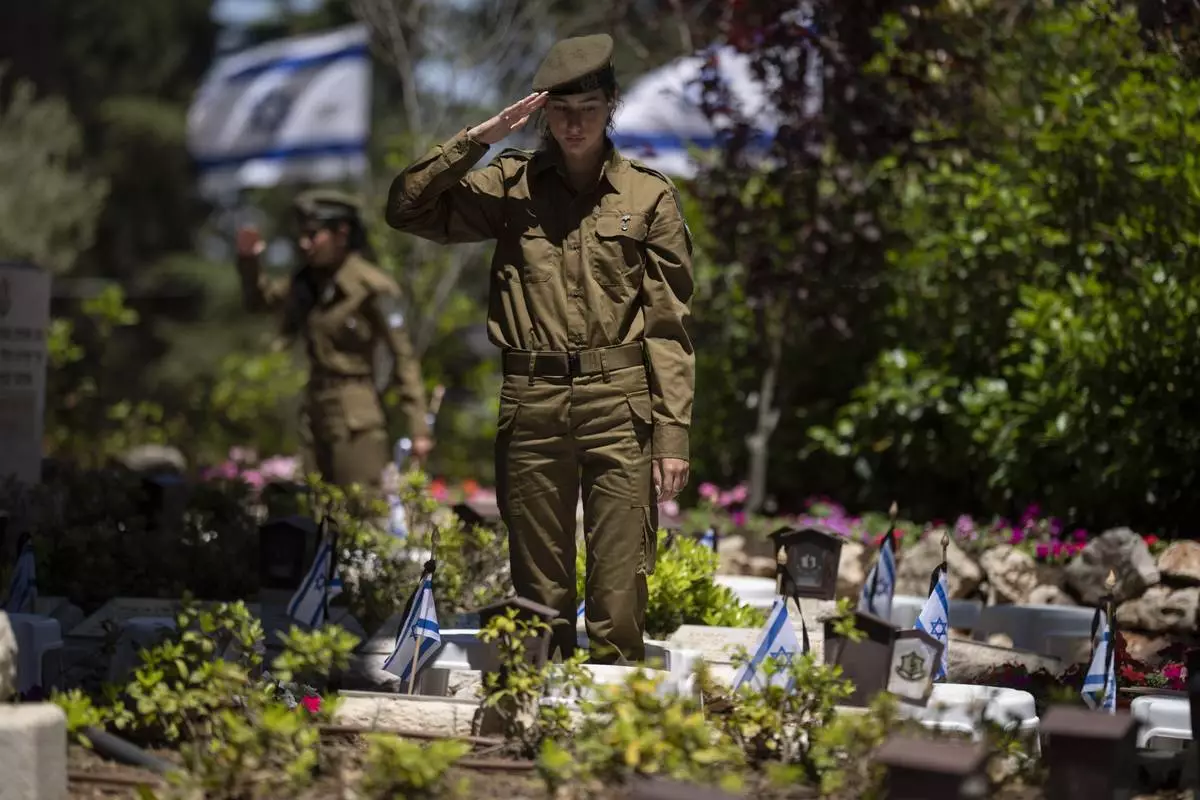
An Israeli soldier salutes after placing a flag with black ribbons on the grave of a soldier ahead of the country's memorial day for fallen soldiers at the Mount Herzl military cemetery in Jerusalem, Isreal, Wednesday, May 8, 2024. Israel marks the annual Memorial Day in remembrance of soldiers who died in the nation's conflicts. (AP Photo/Leo Correa)

Israeli soldiers work on armored military vehicles at a staging ground near the Israeli-Gaza border, in southern Israel, Wednesday, May 8, 2024. (AP Photo/Tsafrir Abayov)
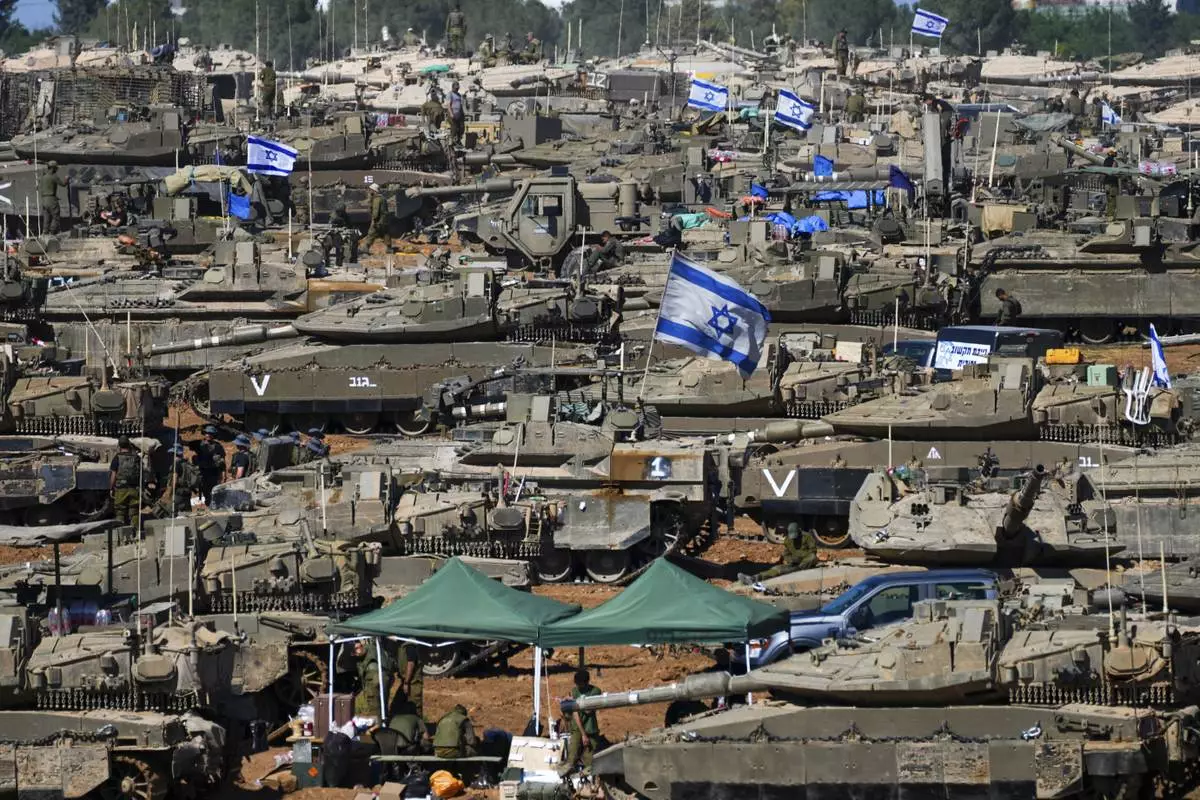
Israeli soldiers work on armored military vehicles at a staging ground near the Israeli-Gaza border, in southern Israel, Wednesday, May 8, 2024. (AP Photo/Tsafrir Abayov)

Israeli soldiers work on armored military vehicles at a staging ground near the Israeli-Gaza border, in southern Israel, Wednesday, May 8, 2024. (AP Photo/Tsafrir Abayov)
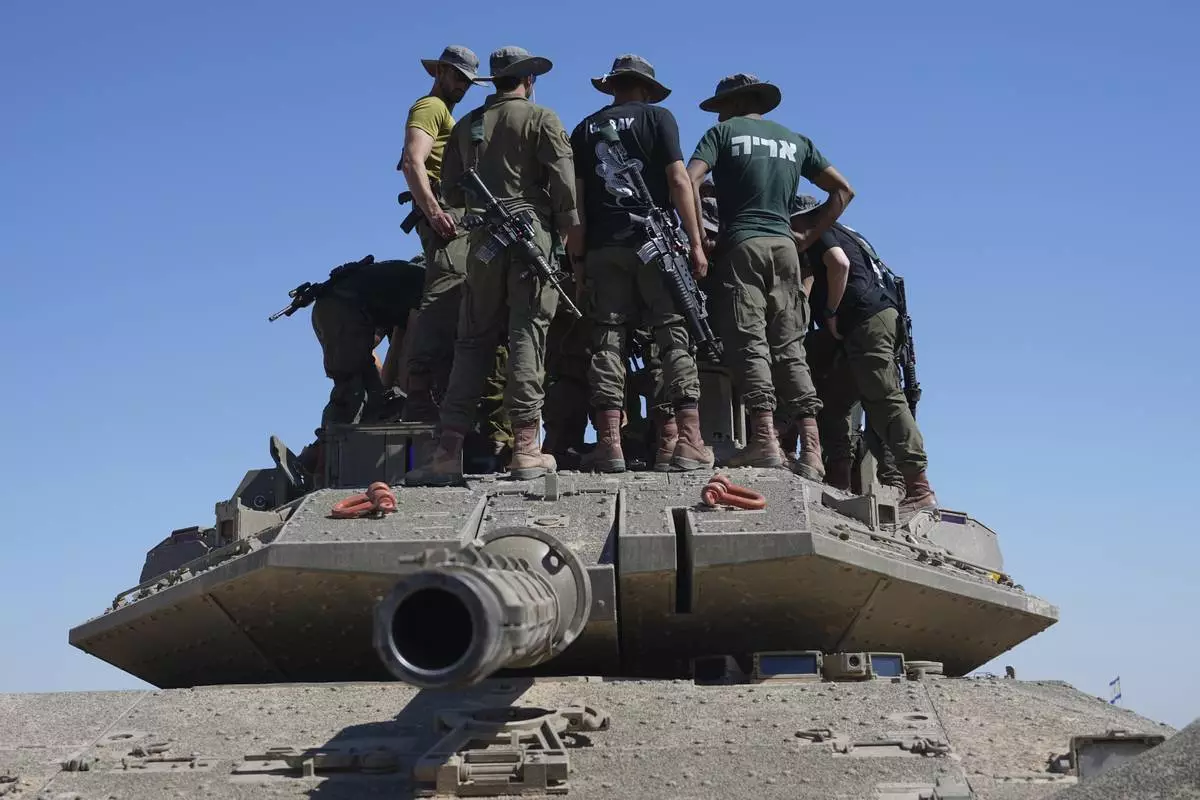
Israeli soldiers work on armored military vehicles at a staging ground near the Israeli-Gaza border, in southern Israel, Wednesday, May 8, 2024. (AP Photo/Tsafrir Abayov)
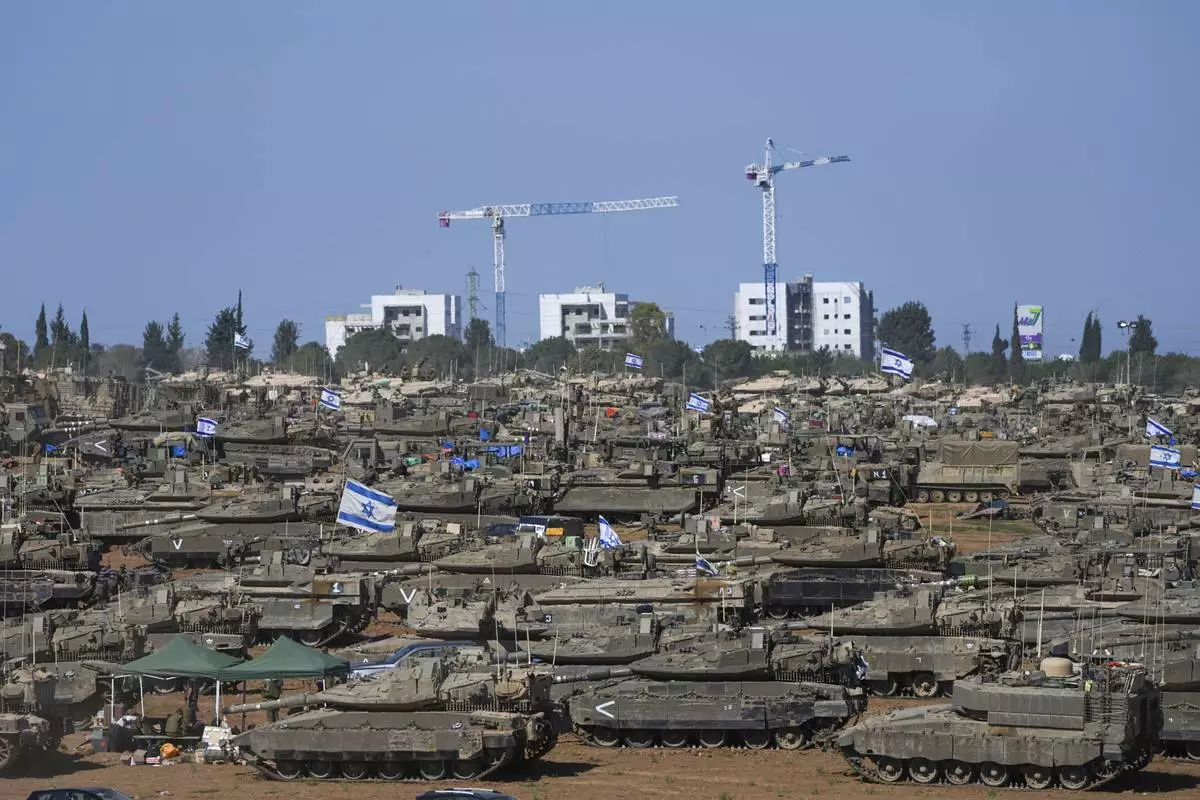
Israeli soldiers work on armored military vehicles at a staging ground near the Israeli-Gaza border, in southern Israel, Wednesday, May 8, 2024. (AP Photo/Tsafrir Abayov)
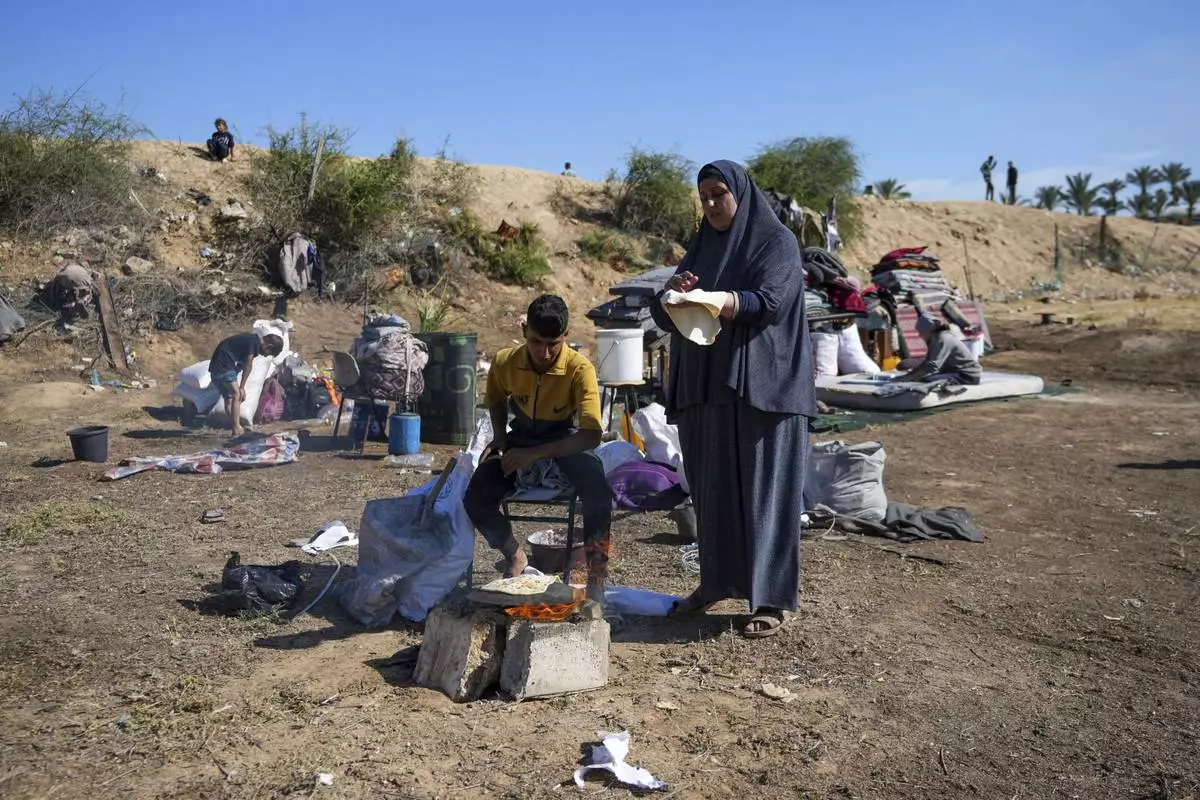
Displaced Palestinians arrive in central Gaza after fleeing from the southern Gaza city of Rafah in Deir al Balah, Gaza Strip, on Wednesday, May 7, 2024. The Israeli army has ordered tens of thousands of people to evacuate Rafah as it conducts a ground operation there. (AP Photo/Abdel Kareem Hana)
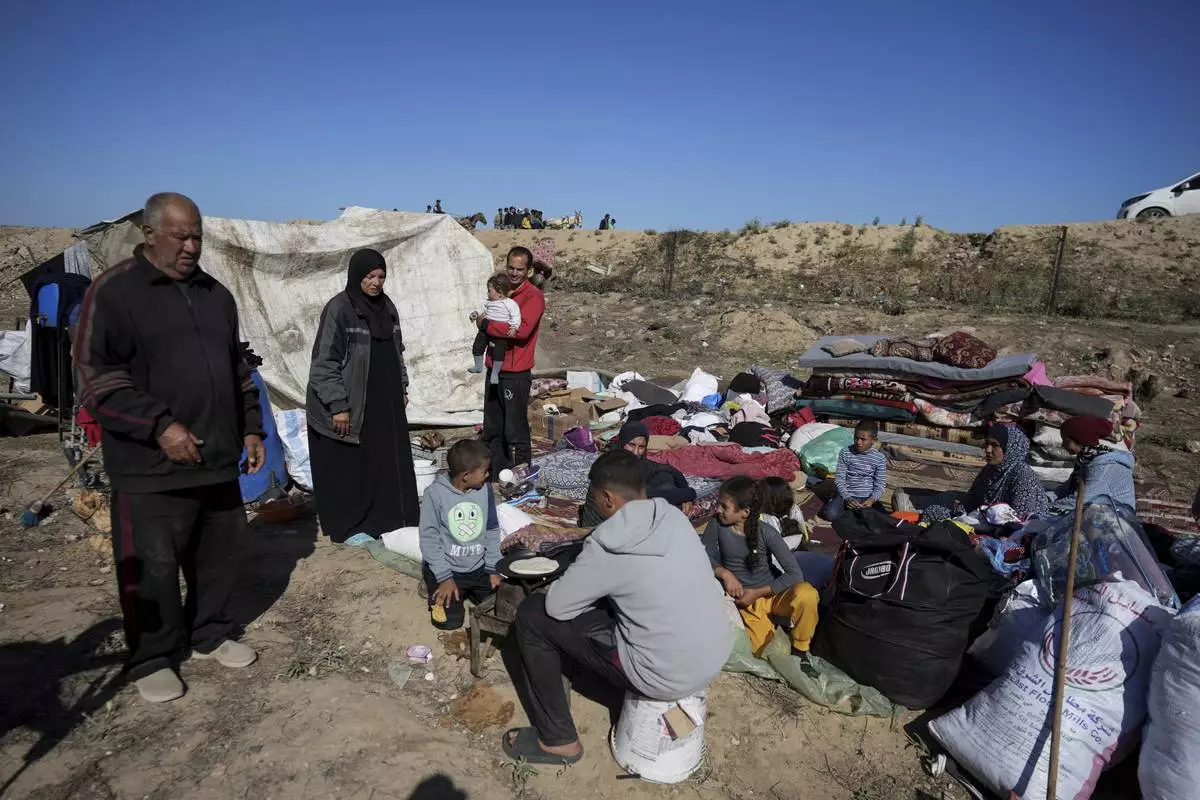
Displaced Palestinians arrive in central Gaza after fleeing from the southern Gaza city of Rafah in Deir al Balah, Gaza Strip, on Wednesday, May 7, 2024. The Israeli army has ordered tens of thousands of people to evacuate Rafah as it conducts a ground operation there. (AP Photo/Abdel Kareem Hana)
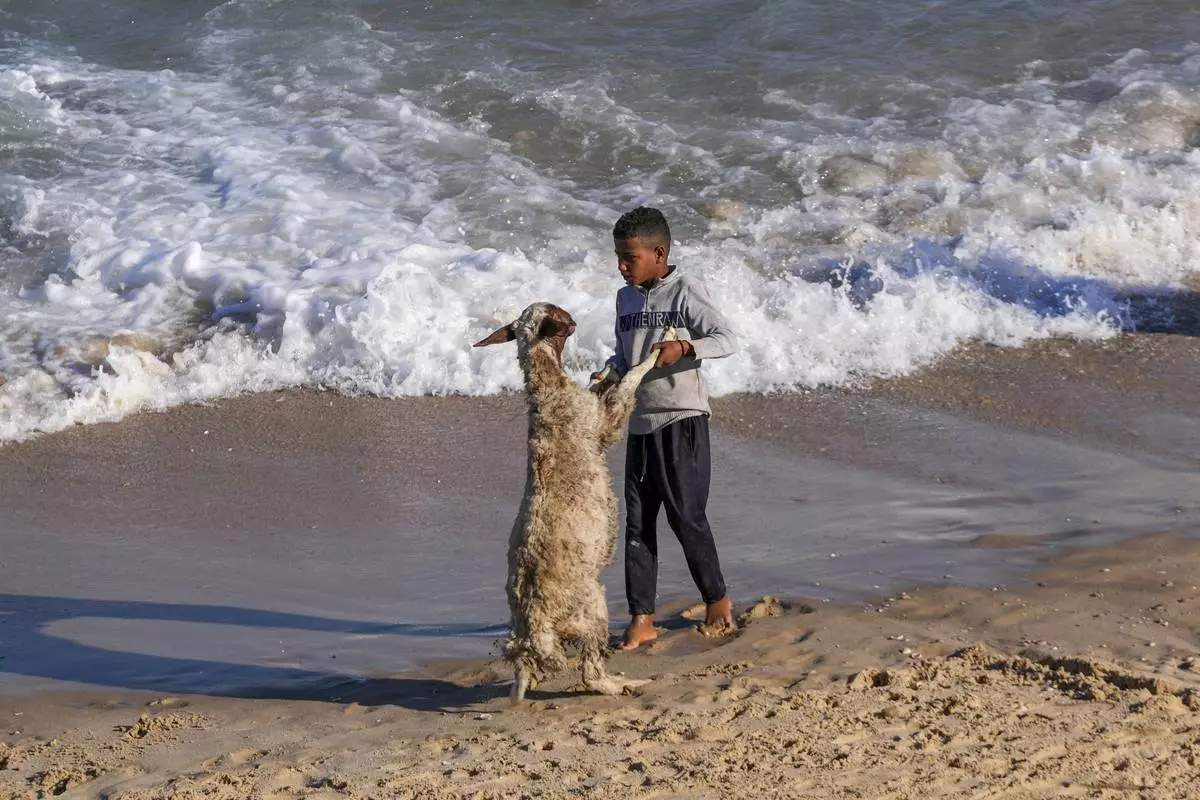
Palestinians wash their flock in the Mediterranean Sea at the beach in Deir al Balah, Gaza Strip, on Wednesday, May 7, 2024. (AP Photo/Abdel Kareem Hana)
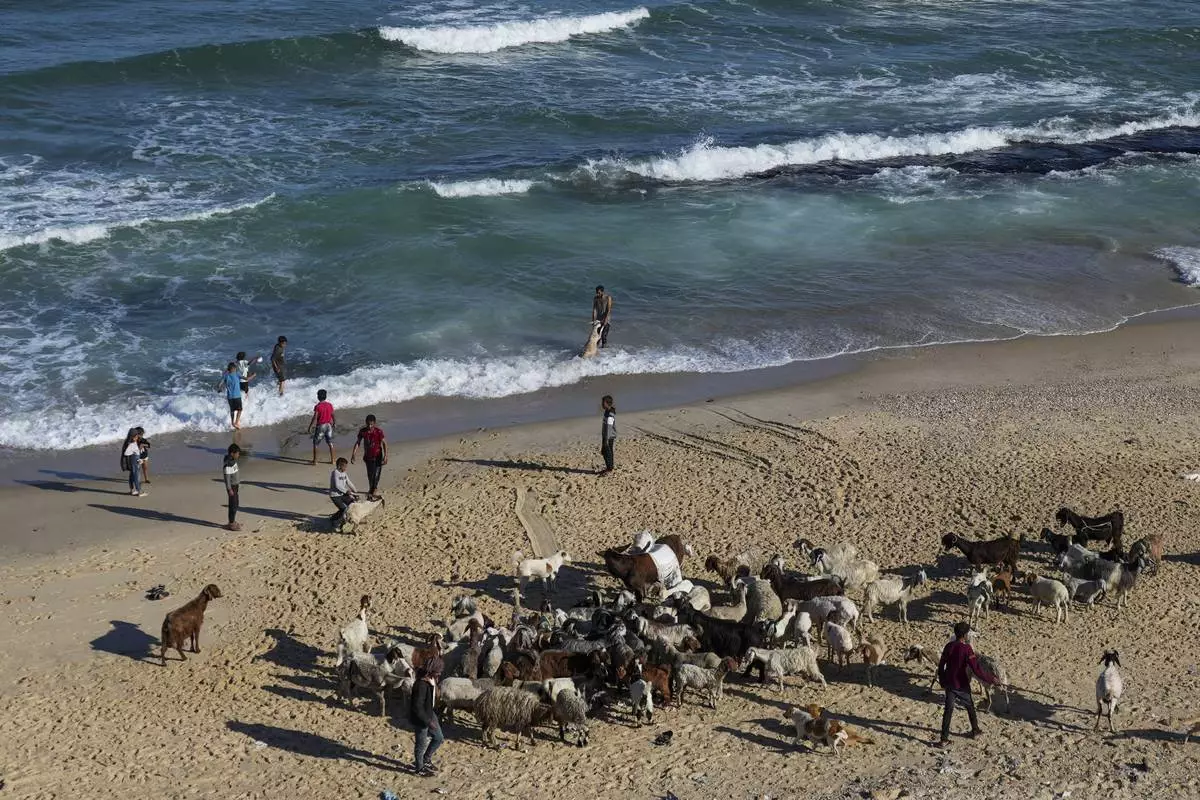
Palestinians wash their flock in the Mediterranean Sea at the beach in Deir al Balah, Gaza Strip, on Wednesday, May 8, 2024. (AP Photo/Abdel Kareem Hana)

Israeli soldiers move on armored personnel carriers (APC) near the Israeli-Gaza border, in southern Israel, Wednesday, May 8, 2024. (AP Photo/Tsafrir Abayov)

Displaced Palestinians arrive in central Gaza after fleeing from the southern Gaza city of Rafah in Deir al Balah, Gaza Strip, on Wednesday, May 7, 2024. The Israeli army has ordered tens of thousands of people to evacuate Rafah as it conducts a ground operation there. (AP Photo/Abdel Kareem Hana)
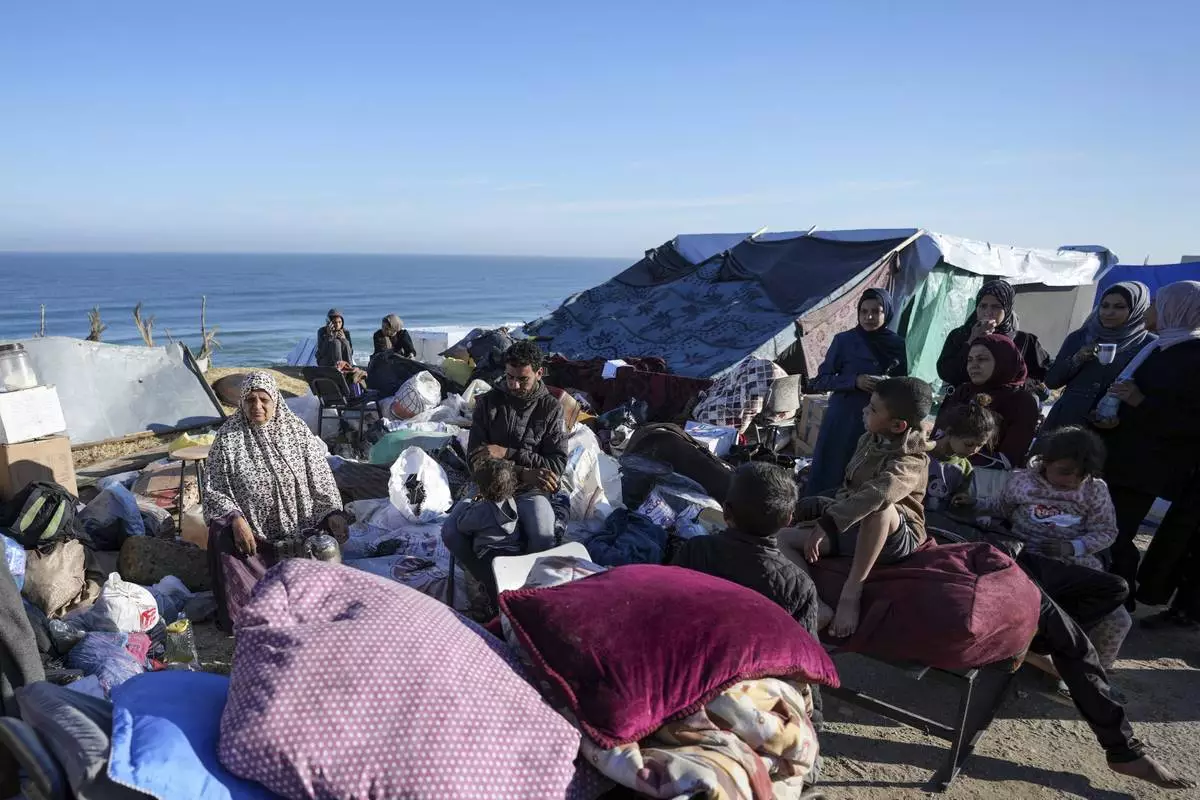
Displaced Palestinians arrive in central Gaza after fleeing from the southern Gaza city of Rafah in Deir al Balah, Gaza Strip, on Wednesday, May 7, 2024. The Israeli army has ordered tens of thousands of people to evacuate Rafah as it conducts a ground operation there. (AP Photo/Abdel Kareem Hana)
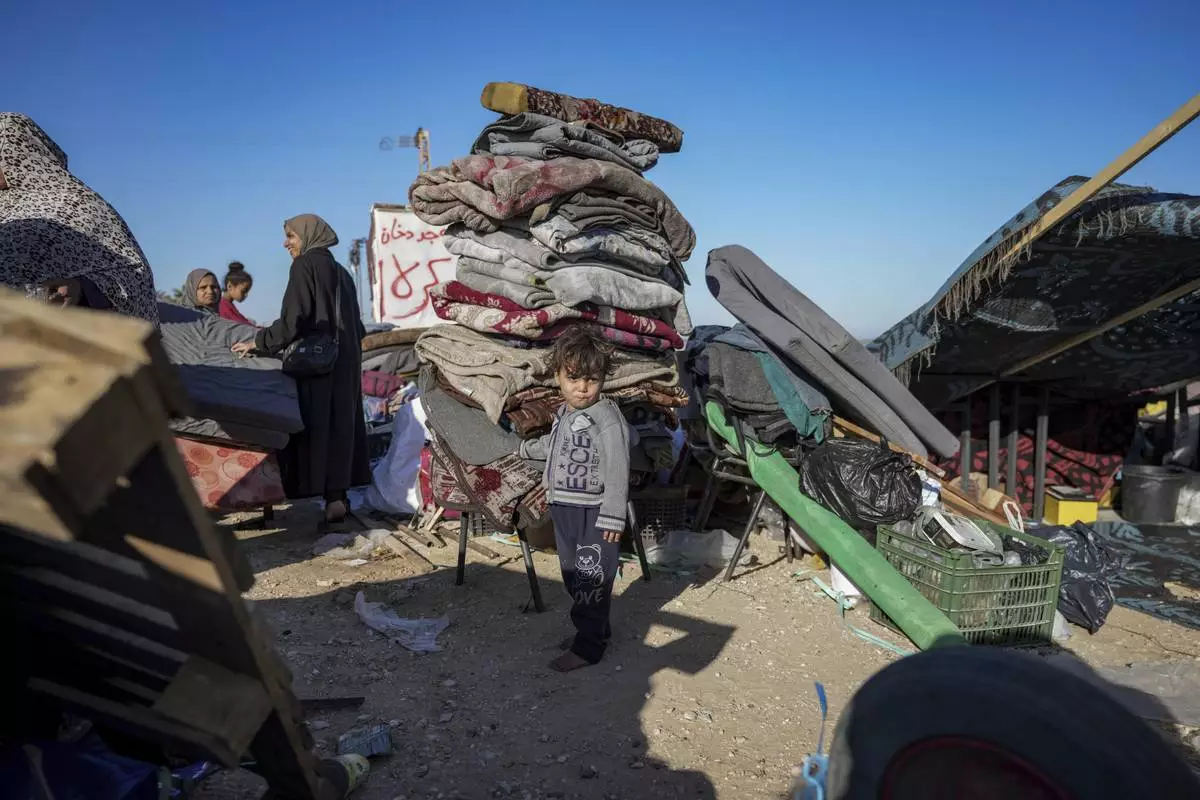
Displaced Palestinians arrive in central Gaza after fleeing from the southern Gaza city of Rafah in Deir al Balah, Gaza Strip, on Wednesday, May 8, 2024. The Israeli army has ordered tens of thousands of people to evacuate Rafah as it conducts a ground operation there. (AP Photo/Abdel Kareem Hana)

Israeli soldiers move on armored personnel carriers (APC) near the Israeli-Gaza border, in southern Israel, Wednesday, May 8, 2024. (AP Photo/Tsafrir Abayov)
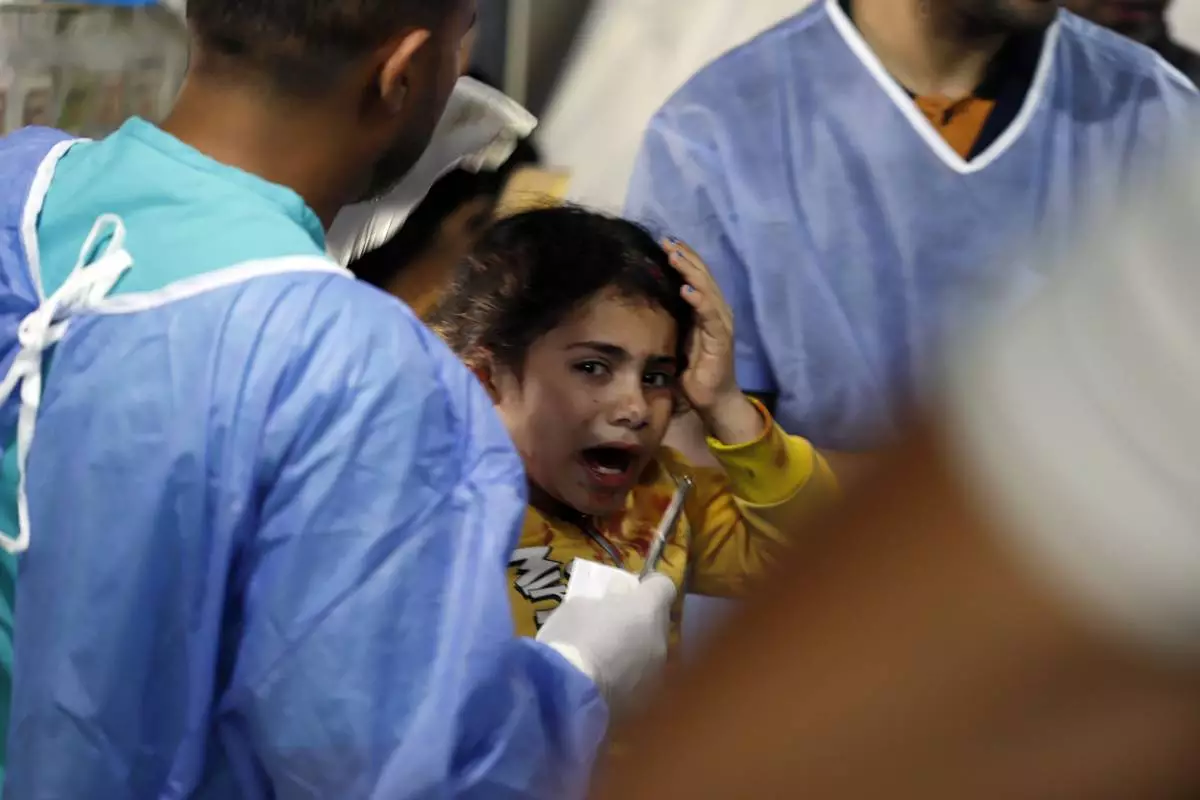
Palestinian medics treat a girl wounded in the Israeli bombardment of the Gaza Strip at the Kuwaiti Hospital in Rafah refugee camp, southern Gaza, Tuesday, May 7, 2024. (AP Photo/Ramez Habboub)
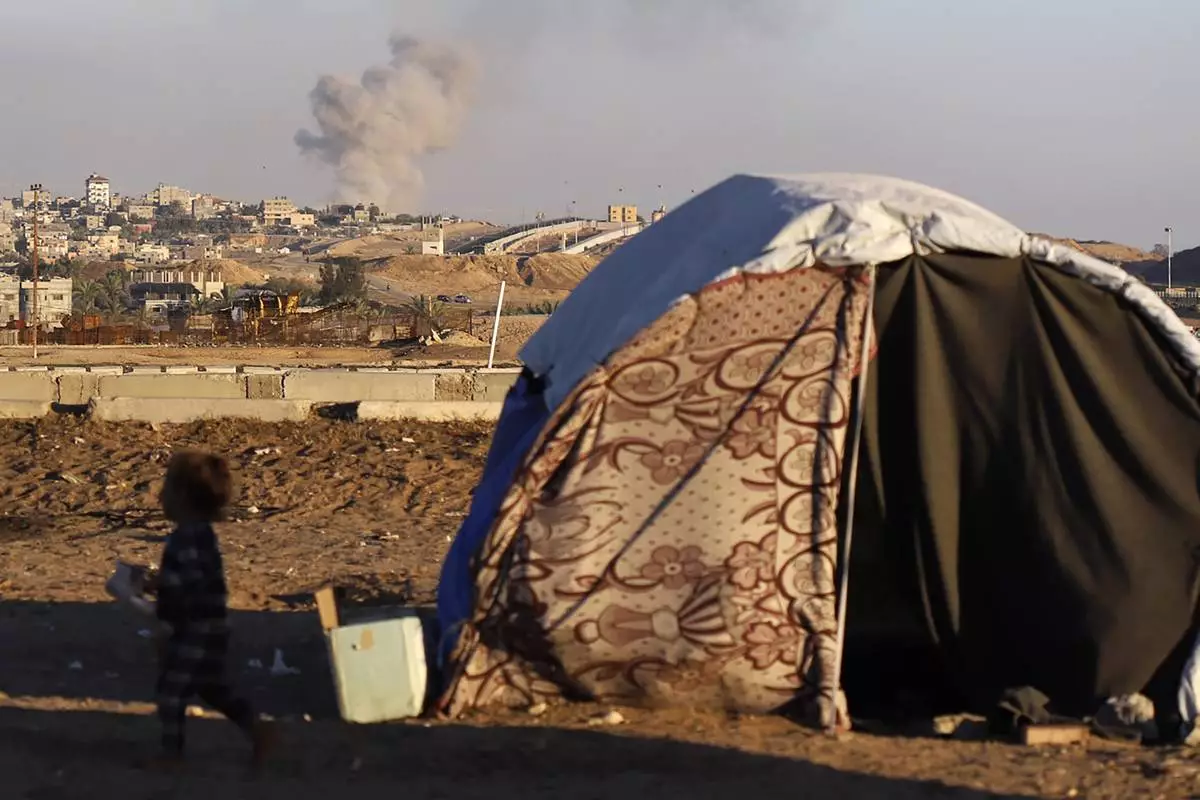
Smoke rises following an Israeli airstrike on buildings near the separating wall between Egypt and Rafah, southern Gaza Strip, Tuesday, May 7, 2024. (AP Photo/Ramez Habboub)
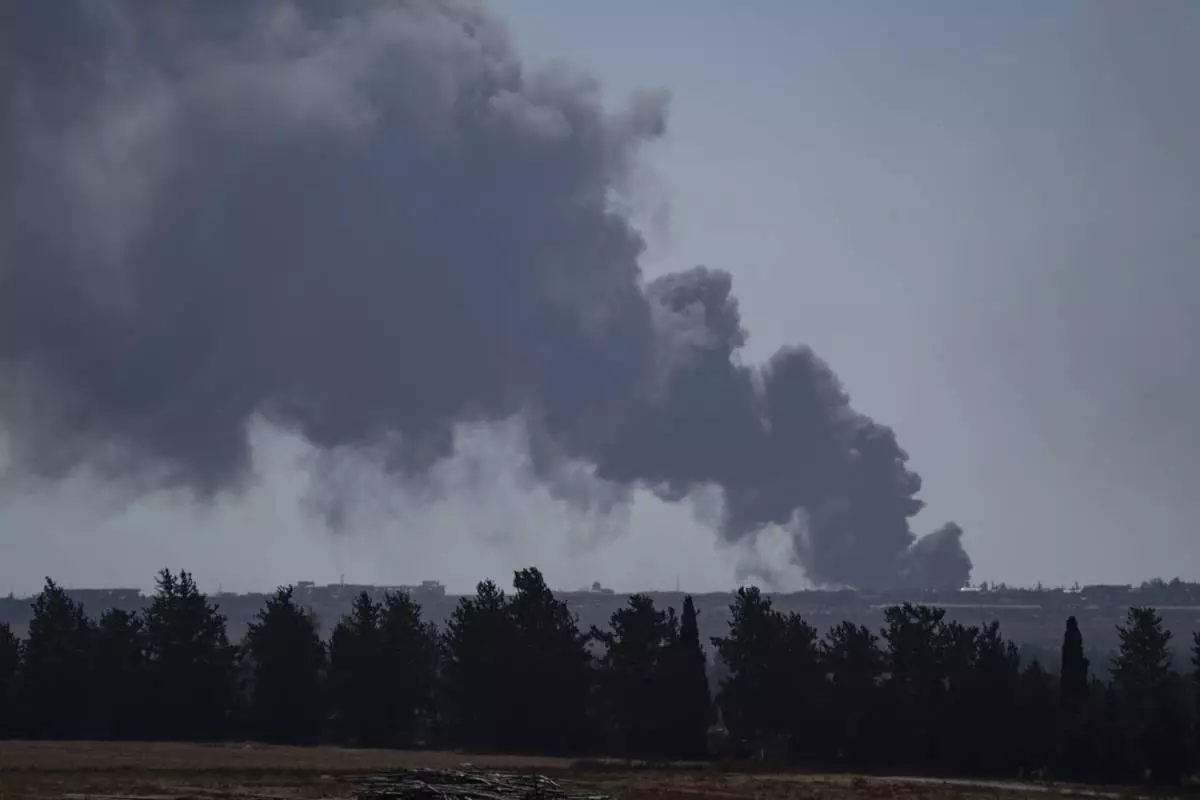
Smoke rises following an Israeli bombardment in the Gaza Strip as seen from southern Israel, Tuesday, May 7, 2024. (AP Photo/Leo Correa)
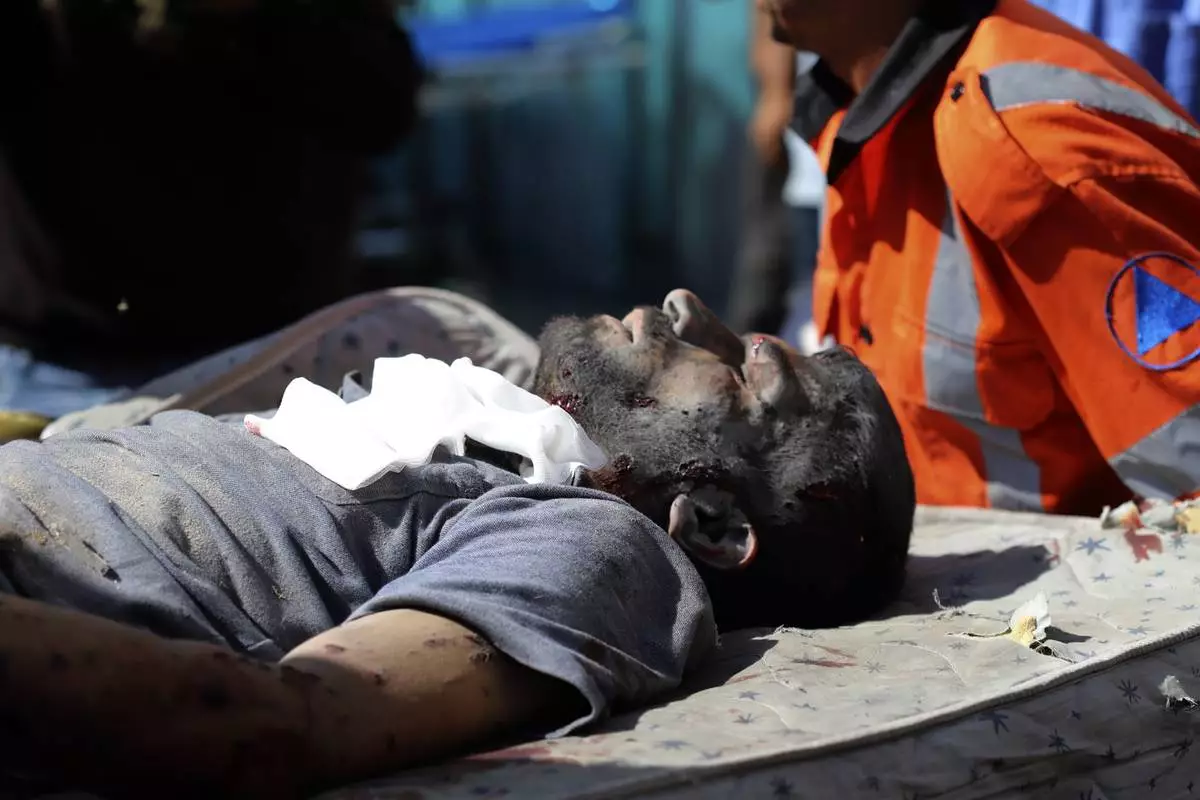
A Palestinian man who was seriously wounded in the Israeli bombardment of the Gaza Strip is brought to the Kuwaiti Hospital in Rafah refugee camp, southern Gaza, Tuesday, May 7, 2024. (AP Photo/Ramez Habboub
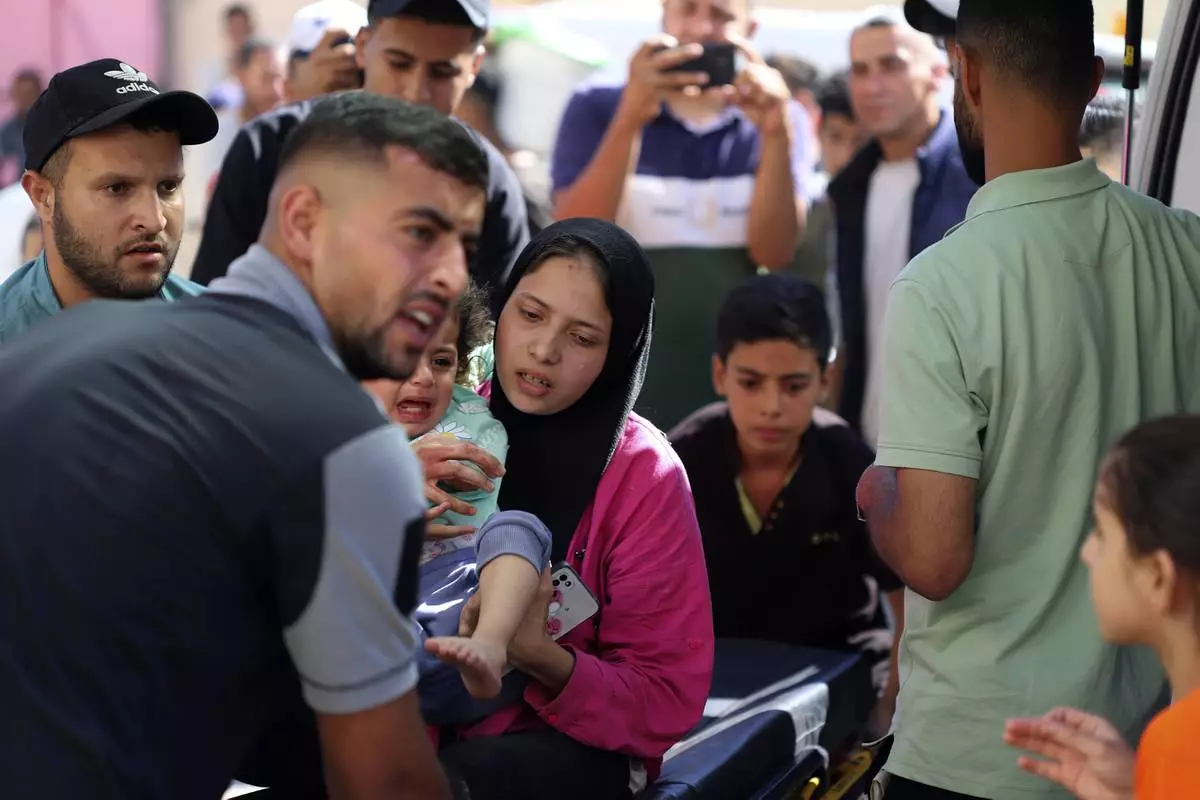
A Palestinian child is brought to the Kuwaiti Hospital after being wounded in the Israeli bombardment of the Gaza Strip, in Rafah refugee camp, southern Gaza, Tuesday, May 7, 2024. (AP Photo/Ramez Habboub)
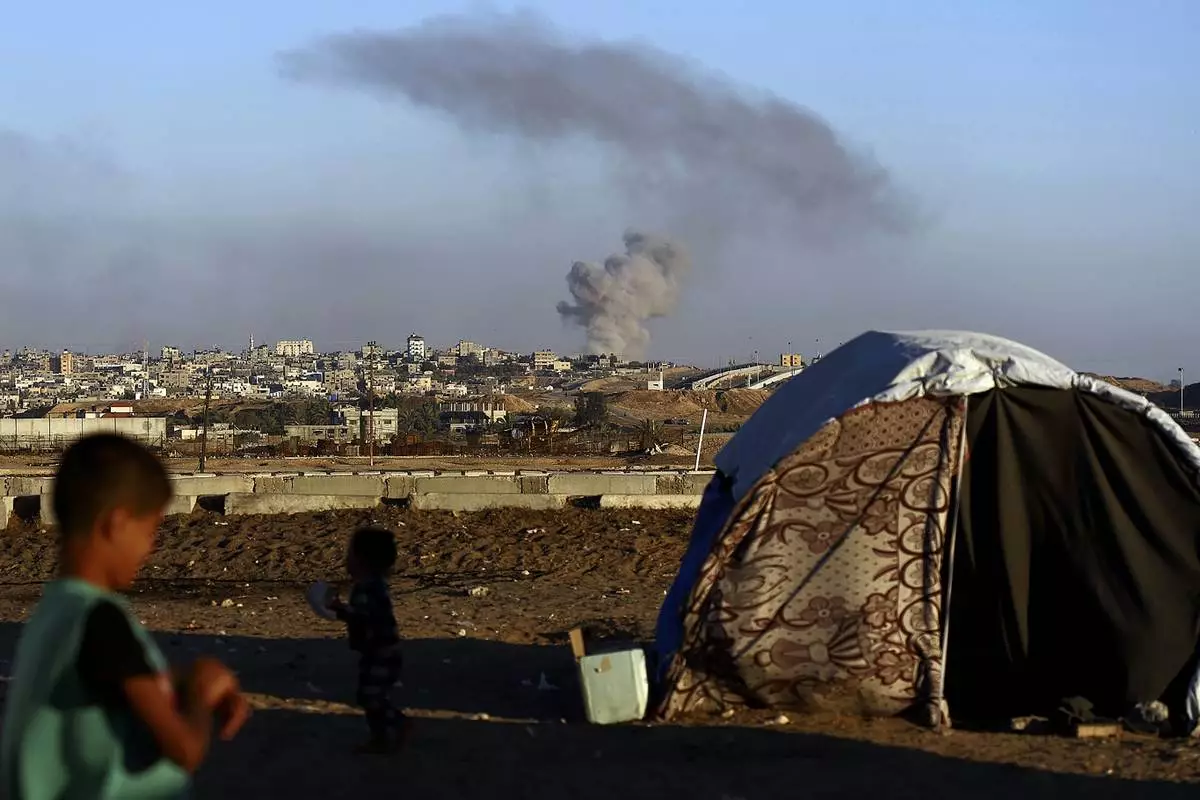
Smoke rises following an Israeli airstrike on buildings near the separating wall between Egypt and Rafah, southern Gaza Strip, Tuesday, May 7, 2024. (AP Photo/Ramez Habboub)

Palestinian medics treat a girl that was wounded in the Israeli bombardment of the Gaza Strip at the Kuwaiti Hospital in Rafah refugee camp, southern Gaza, Tuesday, May 7, 2024. (AP Photo/Ramez Habboub)
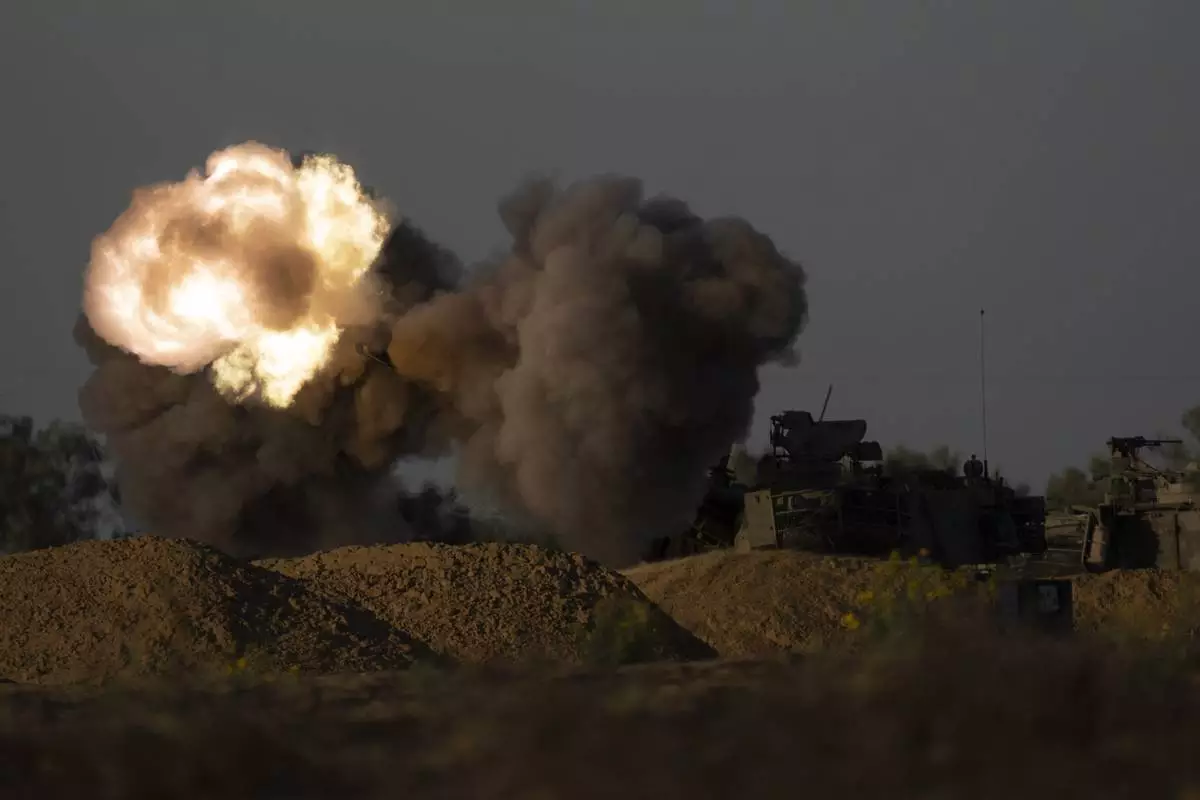
An Israeli mobile artillery unit fires a shell from southern Israel towards the Gaza Strip, in a position near the Israel-Gaza border, Tuesday, May 7, 2024. (AP Photo/Leo Correa)
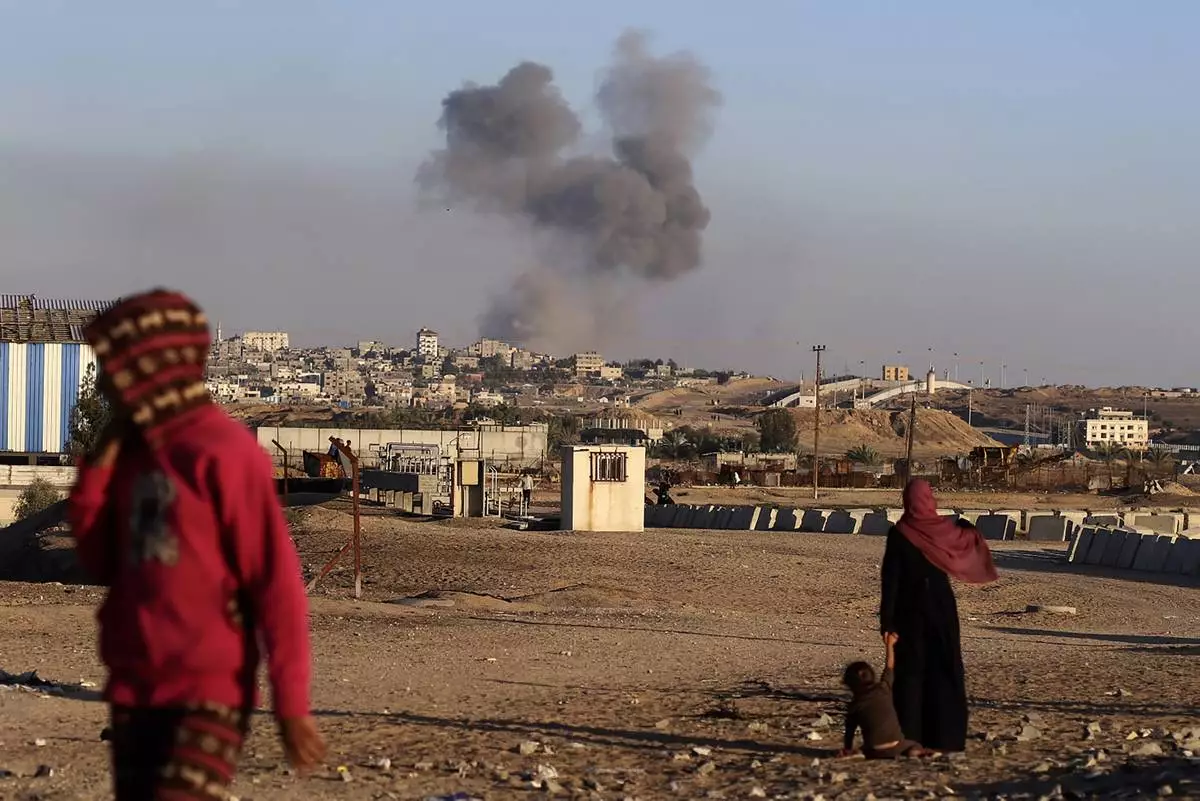
Smoke rises following an Israeli airstrike on buildings near the separating wall between Egypt and Rafah, southern Gaza Strip, Tuesday, May 7, 2024. (AP Photo/Ramez Habboub)





























